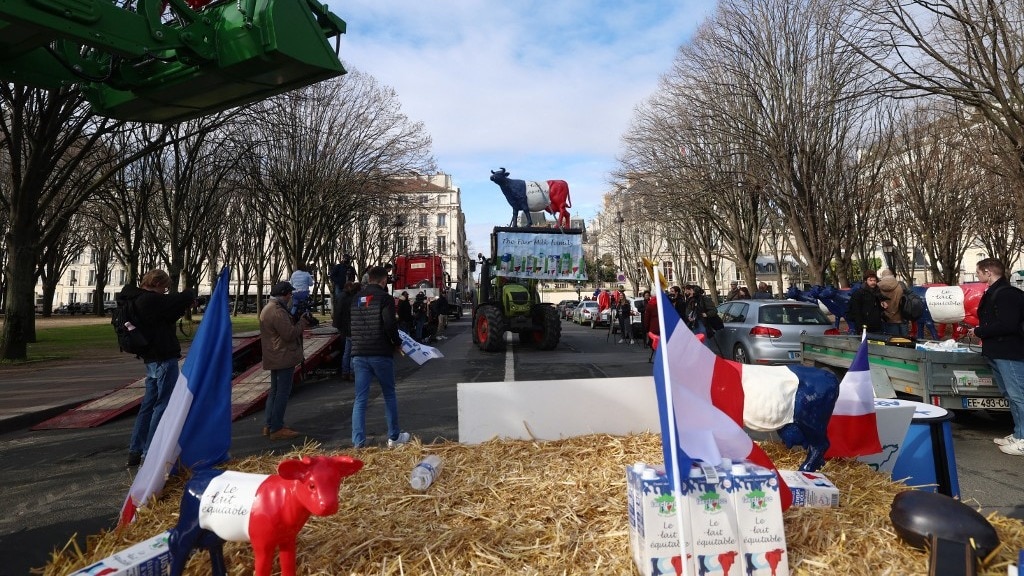2024-02-13 13:41:42
As farmers’ protest 2.0 began on Tuesday, Delhi’s borders have been strengthened and sealed in some areas in an attempt to prevent a repetition of the farmers’ 2020-21 protest. This came after the penultimate session of discussions between farmer representatives and Union ministers ended inconclusively on Monday night.
The ‘Delhi Chalo’ protest is being staged to demand a legal guarantee to MSP for all crops, full debt waiver for farmers, pension for farmers, the implementation of the Swaminathan Commission’s formula, and withdrawal of cases against farmers during the 2020 protest.
However, Delhi is not the only place where farmers’ protests have broken out. European countries have seen recent outbreaks of farmers’ protest for various reasons, including demands for better pay and protection from foreign competition in France, the phase-out of a tax break on agricultural diesel in Germany, and challenges to EU environmental regulations in other nations.
Let’s have a look at the country-wise situations in Europe and their current status.
FRANCE
Reason: On 29 Jan this year, long lines of tractors blocked highways near Paris and across France. In France, farmers’ unions are unimpressed by the concessions offered by President Emmanuel Macron’s government and are fighting for improved pay, less bureaucracy, and protection from foreign competition. On 31st January, more than 90 farmers were taken into custody as they protested outside a food market in Paris.
Status: French farmers on February 2 gradually lifted their roadblocks around Paris and elsewhere in the country, a day after the French government offered over 400 million euros ($436 million) in various measures meant to answer their grievances over low earnings, heavy regulation and unfair competition from abroad.
GERMANY
Reason: On January 8, German farmers kicked off a week of nationwide protests against subsidy cuts. Farmers called the protests in response to the government’s decision to phase out a tax break on agricultural diesel as it tries to bring its 2024 budget over the finish line while complying with the constitutional court ruling in November forced it to revise its spending plans. Farmers feel this will lead them to bankruptcy.
Status: Since the next sitting of the Bundesrat is scheduled for March 22, an official conclusion to the feud between the government and the farmers could drag on for almost two more months.
SPAIN
On 6 February, Spanish farmers officially began massive nationwide protests, tangling up traffic on dozens of highways. Protest turned violent on February 10, when Spanish police clashed with a group of farmers and truck drivers in Madrid as they tried to access a main road in a bid to block it, one of several protests sweeping the European Union.
Reason: Spanish farmers railed against the EU’s environmental rules and what they see as excessive taxes and red tape.
Status: Farmers plan to maintain their street protests across the country for at least the rest of February, according to the updated schedules of different agricultural groups and organisations.
ITALY
Reason: Farmers in Italy have staged a convoy on the ring road of the capital Rome to protest the cutting of support for the agriculture sector, including the agricultural policies of the EU. Mirroring protests across Europe, farmers in Italy drove their tractors to the town of Flores, in Liguria overnight to protest at the Sanremo Song Festival.
Status: Protests continue in various regions.
BELGIUM
Reason: Hundreds of angry farmers driving tractors entered Brussels and staged a protest in front of the European Parliament against high taxes and increasing costs. The farmers’ protests are against EU measures to make agriculture more sustainable, as well as the 27-member bloc’s move to lift quotas on grain exports from Ukraine.
Status: Blocks persists, farmers target key locations. On February 13, Antwerp, one of Europe’s biggest ports, said that there was disruption at the site due to protests from Belgian farmers.
POLAND
Reason: Farmers in Poland have been blocking roads across the country to call out EU environmental policies and unfair competition from non-EU nations. Polish farmers on February 12 started the third day of a 30-day strike to protest against European Union farming policies. They are demanding measures from both their national government and the bloc to combat production cost hikes, reduced profits and unfair competition from non-EU countries.
Status: Farmers across Poland initiate a month-long general strike.
GREECE
Reason: Farmers have been setting up blockades in central and northern Greece, echoing protests by farmers in other parts of Europe, and have threatened to step up their action unless the government helps them cope with higher energy prices and the growing impact of climate change. On February 2, the Greek government promised help with energy costs for farmers, including a one-year extension of a tax rebate for agricultural diesel, hoping to calm protests by farmers who are also seeking fast compensation for losses in flooding.
Status: Greek farmers dumped chestnuts and apples on the pavement outside an agricultural fair on 3 February and promised to escalate protests after a 6 February meeting.
ROMANIA
Reason: The protests stem from anger about low prices for produce, rising costs, imports of cheap foodstuffs and constraints imposed by the European Union’s drive to fight climate change.
In Romania, hundreds of farmers and truck drivers began protesting three weeks ago, with convoys of tractors and trucks slowing or blocking traffic on national roads near large cities, including the capital Bucharest.
Status: Romania’s coalition government said on February 2, it had reached an agreement with farmers and hauliers to end weeks of protests against high business costs.
LITHUANIA
Reason: Farmers unhappy with agricultural policies took to the capital, Vilnius on January 23 in tractors for a two-day protest. The protesters put forward six main demands to the government. They are asking the government to stop the transit of Russian grain through Lithuania. As the European Union has not put sanctions on Russian food products, some farmers claim that this pushes down the prices of their grain exports. Farmers also demanded a solution to the issue of grasslands.
Status: On January 25, it was reported in local newspapers that permit for farmers’ protest will not be extended at the protest site. Farmers protesting in Vilnius over agricultural policies met with the prime minister on the same day.
farmers protest, farmers protest europe, farmers protest france, farmers protest spain, farmers protest germany, farmers protest italy
Source link
![]()



